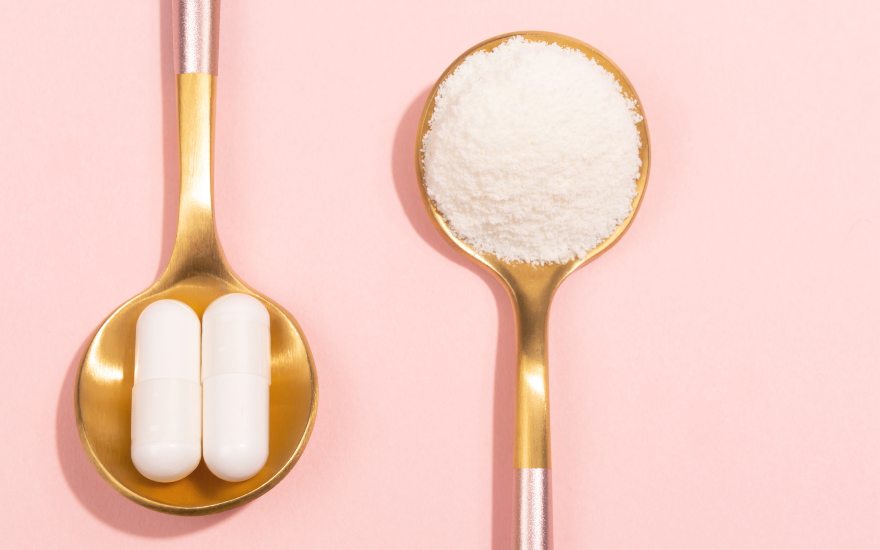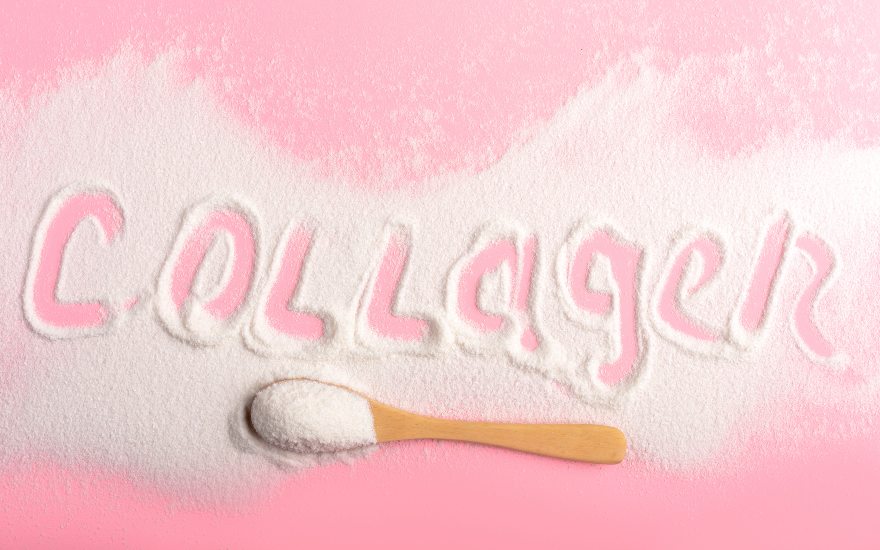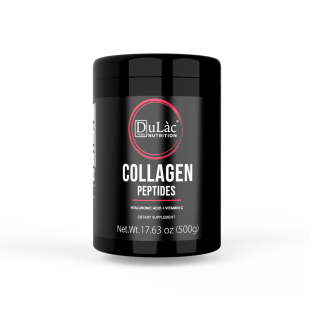Useful information on hydrolyzed collagen and its intake
Collagen is the main protein that makes up human connective tissues, including skin, muscles, joints and tendons. Over time, however, the body reduces its production due to ageing and bad habits such as smoking, an unbalanced diet and many other factors.
To make up for the deficiency of this important substance, many people take hydrolyzed collagen in the form of antioxidant supplements, products that have become very popular in recent years, especially among women and sports people.
This article explains what hydrolyzed collagen is, how you should take it, and what its functions, benefits, and side effects are.
What is hydrolyzed collagen and how is it obtained?
Hydrolyzed collagen is the product obtained by subjecting collagen to the process of hydrolysis.
Hydrolysis allows collagen to be broken down into peptides, that is protein fragments with a lower molecular weight than its original form, in order to make it more easily digested and absorbed. In addition, this process has the ability to cancel or enhance the gelling power of the protein.
Generally, bovine collagen, porcine collagen, chicken collagen, or fish collagen (the so-called hydrolyzed marine collagen) are used to fine-tune the hydrolysis, according to the intended uses.
Plant collagen does not exist, so beware of those who promote certain products as "vegan or vegetarian collagen"! They are usually supplements with Vitamin C - a nutrient that contributes to normal collagen formation - but do not contain the protein.
Once hydrolyzed into peptides, collagen results:
- more soluble in water and other liquids
- easily absorbed in the intestines and skin
- easily digested
- more antioxidant
For all the aforesaid reasons, it is often used as an optimal ingredient in both cosmetics and pharmaceuticals.
In what products can collagen peptides be found?
In cosmetics, collagen peptides are commonly used in facial serums, face creams, and body creams thanks to their strong moisturizing action.
In pharmaceuticals, hydrolyzed collagen is used in the development of antioxidant supplements often combined with hyaluronic acid and vitamin C. Like collagen, hyaluronic acid accounts for a significant percentage of the connective tissue and has a powerful moisturizing action, while vitamin C plays a key role in the synthesis of collagen.
Collagen supplements to be taken orally (either in powder or capsules) are vastly used for the well-being of skin, bones, tendons, connective tissues, and joint cartilage.

Although the human body contains about 30 different types of collagen (depending on the area of the body), the majority of products are based on collagen types I, II, and III.
Type I collagen supplements (of bovine, porcine, or marine origin) are more suitable for skin, bones, tendons, ligaments, teeth, and fibrous cartilage, including that of knee menisci.
Collagen type II (chicken or bovine or porcine cartilage) supplements are mainly recommended for joint health.
Products developed with type III collagen (bovine or porcine) are dedicated to the well-being of connective tissues, blood vessels, and the gut. In contrast, they are not very suitable for skin health, as this form of collagen makes up only 5 percent of the ageing adult skin. But what exactly is hydrolyzed collagen used for?
The many benefits of hydrolyzed collagen
According to the latest research, collagen supplementation helps slow down skin ageing, have a younger-looking skin, counter joint pain, improve lean mass, and strengthen muscles. In addition, hydrolyzed collagen promotes the synthesis of new collagen in the skin and joints.
Numerous studies have investigated the benefits of hydrolyzed collagen and explained how it can improve our health. Below are the many benefits highlighted by the various analyses.
Collagen for the skin
Collagen supplements are largely used as natural antioxidants to improve skin appearance, reduce signs of ageing, and accelerate skin healing.
In fact, as revealed by as many as 19 studies, people who had taken hydrolyzed collagen for 90 days experienced excellent results in terms of wrinkle reduction, hydration and skin elasticity compared to volunteers who had taken only a placebo product (source:https://www.ncbi.nlm.nih.gov/pmc/articles/PMC7070905/).
This phenomenon is partially explained by the fact that collagen peptide levels in the blood are usually very low. Once supplements are taken, the concentration of peptides in the blood increases.
Among them, Pro-Hyp (one of the main food-derived collagen peptides) increases the growth of fibroblasts. These, besides regulating tissue development and growth, promote the synthesis of hyaluronic acid, which in turn keeps the skin hydrated, soft and elastic.

Collagen for joints and bones
There are currently more than 60 research studies demonstrating the benefits of hydrolyzed collagen on joint cartilage, joint pain, and other conditions such as osteoarthritis, osteoporosis, and osteopenia.
Studies have shown that collagen (often combined with Vitamin D and calcium supplements in the case of bone diseases) helps improve bone metabolism and reduce joint pain, even in athletes.
In particular, type II collagen is the one indicated for bone and joint disorders, while type I collagen is particularly good for the well-being of the menisci (found in the knee, temporomandibular and acromioclavicular joints, wrists, and where the ribs join the vertebral transverse joints).
Collagen for muscles
Several studies have shown that supplementing 15 to 20 grams a day of hydrolyzed collagen, either in powder or capsule form, helps improve muscle mass and strength, even in the elderly.
Indeed, being a protein collagen proves very useful for both sports people and people who, due to age, experience a decline in muscle mass and tone.
In both cases, the nutrient supports the work done by resistance training, even though its action would be in vain without constant exercise.
Read also: Arnica: what is it, what is it used for and what are its properties?
Other benefits of hydrolyzed collagen: a win-win ingredient for your heart, hair and nails
Collagen is found in blood vessels and involuntary muscles, but it is still unclear whether supplementing it can improve the health of our cardiovascular system. As studies on this issue are still being carried out, a definite answer cannot yet be given. This applies to both hair and nails too, where the protein is also present.
However, there is scientific evidence (such as the study “ Oral supplementation with specific bioactive collagen peptides improves nail growth and reduces symptoms of brittle nails”) supporting the fact that taking collagen peptides can improve growth and reduce brittle nails.
Possible contraindications and side effects
As anticipated, hydrolyzed collagen supplements are of animal origin (mostly derived from cattle, fish, and poultry).
Due to this, anyone allergic to the meat of these animals may experience severe side effects encompassing facial and body swelling, hives, abdominal pain, respiratory problems, and anaphylactic shock.
Another common effect triggered by taking collagen powder is a sense of fullness, a feeling that is welcome for some and annoying for others.
Conclusions
To sum up: In addition to moisturizing your skin, hydrolyzed collagen supplements confer it a more youthful appearance, counter joint pain, and improve bone and muscle health.
The many studies conducted so far on the benefits provided by taking collagen supplements have led to excellent results.
Despite the favorable outlook, further research is needed to ensure the well-being of your heart, blood vessels and hair.
As for side the effects of hydrolyzed collagen, beware of food allergies! . Since it is an animal derivative, collagen intake should be avoided if you have developed allergies or intolerances to beef, fish, and chicken.
Sources
Aguirre-Cruz G, León-López A, Cruz-Gómez V, Jiménez-Alvarado R, Aguirre-Álvarez G. Collagen Hydrolysates for Skin Protection: Oral Administration and Topical Formulation. Antioxidants (Basel). 2020 Feb 22;9(2):181. doi: 10.3390/antiox9020181. PMID: 32098294; PMCID: PMC7070905.
León-López A, Morales-Peñaloza A, Martínez-Juárez VM, Vargas-Torres A, Zeugolis DI, Aguirre-Álvarez G. Hydrolyzed Collagen-Sources and Applications. Molecules. 2019 Nov 7;24(22):4031. doi: 10.3390/molecules24224031. PMID: 31703345; PMCID: PMC6891674.
de Miranda RB, Weimer P, Rossi RC. Effects of hydrolyzed collagen supplementation on skin aging: a systematic review and meta-analysis. Int J Dermatol. 2021 Dec;60(12):1449-1461. doi: 10.1111/ijd.15518. Epub 2021 Mar 20. PMID: 33742704.
Sato K. The presence of food-derived collagen peptides in human body-structure and biological activity. Food Funct. 2017 Dec 13;8(12):4325-4330. doi: 10.1039/c7fo01275f. PMID: 29114654.
Liu B, Xu Z, Yu R, Wang J, Wang Z, Harrell CR. The Use of Type I and Type III Injectable Human Collagen for Dermal Fill: 10 Years of Clinical Experience in China. Semin Plast Surg. 2005 Aug;19(3):241–50. doi: 10.1055/s-2005-919719. PMCID: PMC2884804.
Ohara H, Iida H, Ito K, Takeuchi Y, Nomura Y. Effects of Pro-Hyp, a collagen hydrolysate-derived peptide, on hyaluronic acid synthesis using in vitro cultured synovium cells and oral ingestion of collagen hydrolysates in a guinea pig model of osteoarthritis. Biosci Biotechnol Biochem. 2010;74(10):2096-9. doi: 10.1271/bbb.100193. Epub 2010 Oct 7. PMID: 20944430.

